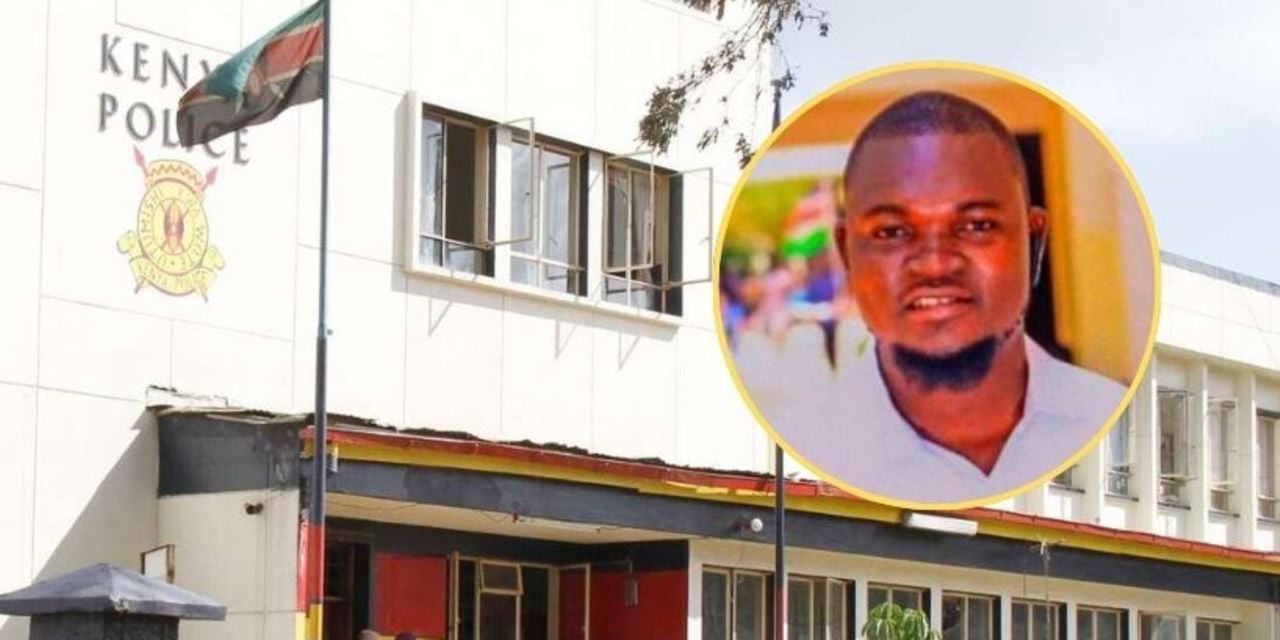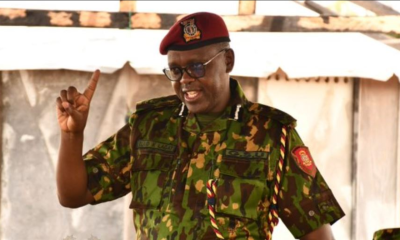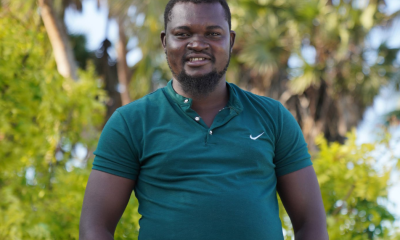Investigations
Picked Up While Taking Lunch and Ended in a Morgue: The Brutal End of Albert Ojwang 400KM Away from Home in Police Custody
Albert sent his final WhatsApp message at 1:57 PM on Saturday, asking a friend for 500 shillings for fuel: “Mzee, nipatie 500 niweke fuel.” By 2:00 PM, he was handcuffed and his phone confiscated. Less than 24 hours later, he was dead.

The quiet Saturday afternoon of June 8, 2025, in Kasipul Kabondo, Homa Bay County, began like any other for the Ojwang family.
They had just said grace and were settling down for lunch when three motorbikes roared into their compound, carrying six men who would shatter their world forever.
Within hours, their only child, Albert Ojwang, would be dead in a police cell 400 kilometers away in Nairobi.
A Teacher’s Last Normal Day
Albert Ojwang, 31, was not just any visitor to his family home that weekend.
The Kiswahili and Religious Studies teacher, who worked in Voi, had come home to run errands.
An alumnus of Pwani University, he was a devoted family man with a wife and a five-month-old baby.
His future seemed promising, his life ordinary in the best possible way.
The arrest was swift and unexplained. The men—later identified as police officers—walked into the compound without ceremony, handcuffed Albert without providing reasons, and whisked him away on their motorbikes.
His father, Meshack Ojwang Opiyo, would later learn that his son had allegedly “insulted a senior person on X (formerly Twitter).”
The 400-Kilometer Journey to Death
What followed was a journey that would end in tragedy.
Albert was first taken to Mawego Police Station before being transferred to Nairobi’s Central Police Station. His father, instructed to follow, boarded a public service vehicle and made the long journey to the capital, not knowing he was traveling to identify his son’s body.
The timeline is chilling in its brevity.
Albert sent his final WhatsApp message at 1:57 PM on Saturday, asking a friend for 500 shillings for fuel: “Mzee, nipatie 500 niweke fuel.”
By 2:00 PM, he was handcuffed and his phone confiscated. Less than 24 hours later, he was dead.
A Father’s Devastating Discovery
When Meshack Opiyo arrived at the Central Police Station on Sunday morning, he expected to see his son.
Instead, he was informed that Albert had died and his body had been taken to Nairobi Funeral Home.
The sight that greeted him there would haunt any parent: his son’s head was deformed, blood was oozing from his nose, his torso and face were bruised, and he was shirtless—not the condition in which he had been handed over to police.
“He was bleeding from the nose and had a bruised torso and face. He was also shirtless but this is not how I handed him over to the police on Saturday. My son died like an animal,” the grief-stricken father said tearfully.
Conflicting Official Accounts
The police version of events has been riddled with inconsistencies from the start.
Initially, officers claimed Albert had hit his head against the walls of the police station cells and died while being taken to Mbagathi Hospital for treatment. Later reports filed at the station claimed he had died by suicide, with an officer allegedly finding him “with blood oozing from his head” during a routine cell visit.
According to National Police Service Spokesperson Michael Muchiri: “NPS confirms that Albert Omondi Ojwang was lawfully arrested by DCI detectives for false publication. While in custody, the suspect sustained head injuries after hitting his head against the cell wall.”
However, the family’s observations tell a different story. Albert’s body showed scratches consistent with being dragged, and the extent of his injuries appeared far beyond what could be self-inflicted by hitting a wall.
The Digital Trail That Led to Death
Albert’s arrest was reportedly linked to a controversial social media post that allegedly defamed a senior police officer.
However, his friends maintain that Albert did not make the post—he only had access to the account. They claim the post had already been taken down by the time he was arrested, and the actual account owner remains in custody.
This raises troubling questions about the thoroughness of the investigation that led to Albert’s arrest and whether he died for something he didn’t even do.
A Terrified Voice from Custody
Perhaps the most heartbreaking detail emerged from Albert’s final phone call to a friend while in custody.
Having never been arrested before, he was terrified and asked his friend how the system works when you’re in custody.
The friend reassured him: “If you’re in Central, you’ll be fine. We’ll come for you in the morning.”
It was a promise that would never be kept. Albert’s premonition of danger proved tragically accurate.
Systematic Cover-Up Attempts
The family’s attempts to understand what happened to Albert have been met with obstruction at every turn. When they asked to see the cell where Albert allegedly died, they were denied access.
Family lawyer Julius Juma reported that by evening, they still had not been allowed in, with officers claiming they didn’t have the authority to speak to them.
“There are a lot of inconsistencies in the police’s version of events. The police can’t even explain themselves consistently,” Juma said.
Swift Official Response Amid Public Outrage
The case has generated significant public outcry, forcing swift action from the highest levels of law enforcement.
Inspector-General of Police Douglas Kanja has interdicted the Officer Commanding the Station (OCS) at Nairobi’s Central Police Station and all officers who were on duty the night Albert died.
“To ensure a thorough, impartial, and expeditious investigation by the Independent Policing Oversight Authority (IPOA), the Inspector-General of the National Police has ordered the interdiction of the officers with immediate effect,” spokesperson Michael Muchiri said.
The Law Society of Kenya has also weighed in, with President Faith Odhiambo stating: “The stories that are being shared—we feel that they are lies and an attempt to cover up what really happened.”
A Pattern of Deaths in Custody
Albert’s death is not an isolated incident but part of a disturbing pattern of deaths in police custody across Kenya.
Recent similar cases have raised serious questions about police accountability and the treatment of detainees.
The circumstances of Albert’s death—from the lack of transparency to the conflicting official accounts—mirror other controversial cases that have eroded public trust in law enforcement.
Amnesty Kenya has condemned the death, stating that “No Kenyan should lose their life in police custody, and those entrusted with their protection” have “a legal and moral duty to ensure the safety and well-being” of detainees.
The Human Cost of Alleged Social Media Crimes
Albert Ojwang was more than the circumstances of his death.
Friends remember him as a gentle Manchester United fan who was passionate about teaching.
He was a young father trying to make ends meet—his final message was a request for fuel money from a friend.
He was an ordinary Kenyan whose life was cut short in extraordinary and brutal circumstances.
His story raises fundamental questions about proportionality in law enforcement.
Even if he had made the alleged social media post, would it justify the use of force that led to his death? The answer from any civilized society should be a resounding no.
The Long Road to Justice
As investigations by the Independent Policing Oversight Authority continue, Albert’s family and the Kenyan public await answers.
The interdiction of the officers involved is a start, but it cannot bring back a young teacher whose only crime may have been having access to a social media account.
The case has become a symbol of broader issues plaguing Kenya’s law enforcement: lack of accountability, excessive use of force, and a culture of impunity that allows officers to act with apparent disregard for human life.
Albert Ojwang left home on a Saturday afternoon to run errands and ended up in a morgue 400 kilometers away by Sunday morning.
His father’s anguished words—“My son died like an animal”—should haunt every Kenyan until justice is served and systematic reforms ensure that no other family suffers such a devastating loss.
The investigation continues, but for Meshack Opiyo and his family, no amount of justice can fill the void left by their only child, whose promising life was brutally cut short in the darkness of a police cell far from home.
This story continues to develop as investigations proceed. The family has called for justice and transparency in determining the exact circumstances that led to Albert Ojwang’s death in police custody.
Kenya Insights allows guest blogging, if you want to be published on Kenya’s most authoritative and accurate blog, have an expose, news TIPS, story angles, human interest stories, drop us an email on [email protected] or via Telegram
-

 Business1 week ago
Business1 week agobetPawa Empire Crumbles: Mr Eazi’s Betting Gambit Unravels Amid Partner’s Shadowy Deals
-

 News6 days ago
News6 days agoDCI Probes Meridian Equator Hospital After Botched Procedure That Killed a Lawyer
-

 Business6 days ago
Business6 days agoMinnesota Fraud, Rice Saga, Medical Equipment Deal: Why BBS Mall Owner Abdiweli Hassan is Becoming The Face of Controversial Somali Businessman in Nairobi
-

 Business1 week ago
Business1 week agoKRA Boss Humphrey Watanga In Big Trouble In Sh5.5 Billion Rice Import Scandal
-

 Investigations2 weeks ago
Investigations2 weeks agoKERRA Homa Bay Region Manager Calvince Thomas Accused of Swindling Businessman Ksh 2 Million in Phantom Tender Deal
-

 Business1 week ago
Business1 week agoState Set to Demolish Pastor Ng’ang’a’s Church in Sh28 Billion Railway City Push
-

 Politics5 days ago
Politics5 days agoYour Excellency! How Ida’s New Job Title From Ruto’s Envoy Job Is Likely to Impact Luo Politics Post Raila
-

 Business1 week ago
Business1 week agoControversial Turkish Firm Celebi Canceled in India Over Security Concerns Acquires Strategic Property in Nairobi’s Main Airport






























